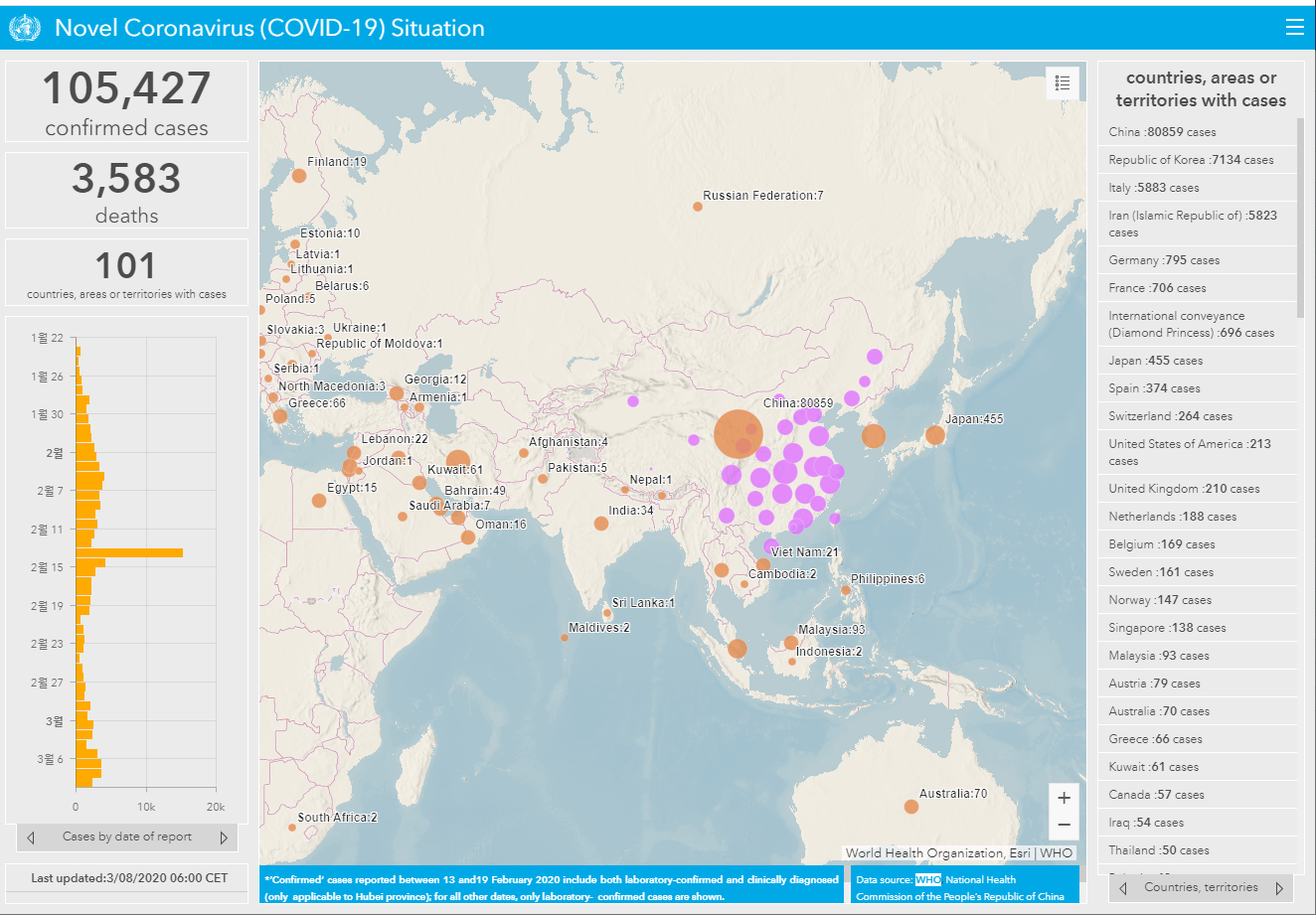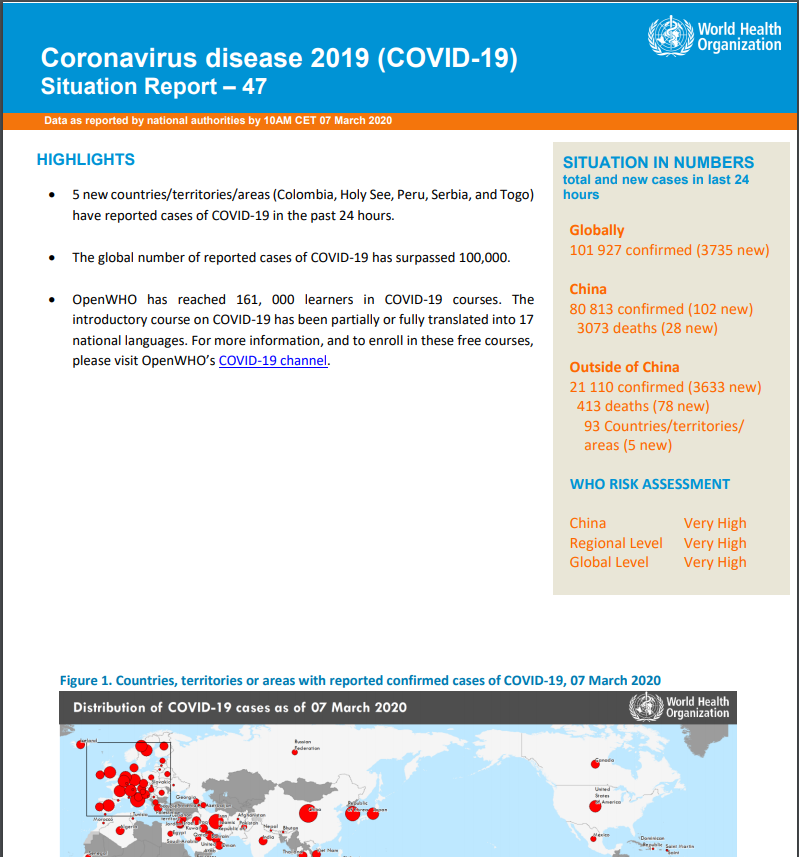

2020 년 3 월 5 일-COVID-19 미디어 브리핑에서 WHO 사무 총장의 발언
2020 년 3 월 5 일
العربية 中文 FrançaisEspañol
안녕하세요. 직접 만나서 온라인에 참여해 주셔서 다시 한 번 감사드립니다.
오늘 저는 미디어의 모든 동료들에게 감사의 말을 전합니다. 정보 제공 업체로서 COVID-19에 대한 대응에 중요한 역할을합니다.
소문과 잘못된 정보와의 싸움은이 바이러스와의 싸움에서 중요한 부분입니다. 우리는 사람들이 그들이 직면 한 위협과 자신과 다른 사람들을 보호하는 방법에 대한 정확한 정보를 가지고 있는지 확인하기 위해 당신을 의지합니다.
이제 숫자로.
현재 전 세계적으로 총 95,265 건의 COVID-19 사례가보고되었으며 3281 명이 사망했습니다.
지난 24 시간 동안 중국은 143 건을보고했습니다. 후베이 성에서 대부분의 사례가 계속보고되고 있으며, 지난 14 일 동안 8 개 주에서 사례가보고되지 않았습니다.
중국 이외의 국가에서는 2055 건이 33 개국에서보고되었다. 이 사례의 약 80 %가 3 개국에서 계속 온다.
우리는 한국의 고무적인 조짐을 보았습니다. 새로보고 된 사례의 수가 감소하는 것으로 보이며보고중인 사례는 주로 알려진 클러스터에서 식별되고 있습니다.
소수의 국가에서 많은 사례가보고되고 있지만 115 개 국가에서는 사례가보고되지 않았습니다.
21 개국이 한 건의 사례 만보고했습니다.
그리고 사례를보고 한 5 개국은 지난 14 일 동안 새로운 사례를보고하지 않았습니다.
이들 국가와 중국의 경험은 이것이 일방 통행 거리가 아님을 계속 보여줍니다.
이 전염병은 철회 될 수 있지만, 정부의 전체 기계 장치에 관여하는 종합적이고 체계적이고 포괄적 인 접근 방식으로 만 추진 될 수 있습니다.
우리는 모든 국가에 속도, 규모 및 명확한 의사 결정을 요구합니다.
비록 우리는 소수의 국가에서 대부분의 사례를 계속보고 있지만, 사례가보고되는 국가, 특히 건강 체계가 약한 나라의 수가 증가하는 것에 대해 깊이 우려하고 있습니다.
그러나이 전염병은 부자와 가난한 모든 나라에 위협이됩니다. 앞서 언급했듯이 고소득 국가조차도 놀라움을 기대해야합니다. 해결책은 적극적인 준비입니다.
일부 국가에서는이 문제를 심각하게 받아들이지 않았거나 할 수있는 일이 없다고 결정했습니다.
우리는 일부 국가에서 정치적 헌신 수준과 그 약속을 입증하는 행동이 우리 모두가 직면 한 위협 수준과 일치하지 않는다고 우려하고 있습니다.
이것은 훈련이 아닙니다.
지금은 포기할 때가 아닙니다.
지금은 변명 할 시간이 아닙니다.
모든 정류장을 당기는 시간입니다.
국가들은 수십 년 동안 이와 같은 시나리오를 계획하고 있습니다. 이제 그 계획에 따라 행동 할 때입니다.
이들은 정상에서 리더십으로 시작하여 안보, 외교, 금융, 상업, 운송, 무역, 정보 등 보건부뿐만 아니라 정부의 모든 부분을 조정하는 정부의 모든 부분을 조정하는 계획입니다.
전체 정부 접근 방식을 통해 비상 계획을 활성화하십시오.
사람들이 증상이 무엇인지, 자신과 타인을 보호하는 방법을 알 수 있도록 대중을 교육하십시오.
테스트 용량을 늘리십시오.
병원을 준비하십시오.
필수 소모품이 있는지 확인하십시오.
의료진을 훈련시켜 사례를 식별하고 신중하고 자비로운 치료를 제공하며 감염으로부터 자신을 보호하십시오.
국가가 적극적으로 사건을 찾고, 격리하고, 모든 접촉을 추적하기 위해이 전염병의 궤적을 바꿀 수 있습니다.
우리가 할 수있는 일이 없다는 접근 방식을 취한다면, 그것은 곧 자기 충족 예언이 될 것입니다.
우리 손에 달려 있습니다.
WHO는 국가가 국가 별 행동 계획을 개발하기위한 단계별 지침을 8 가지 주요 영역에 따라 발표했으며, 이는 상세한 기술 지침에 의해 뒷받침됩니다.
우리는 이러한 계획을 가속화하기 위해 모든 국가에 촉구하며,이를 위해 그들과 협력 할 준비가되어 있습니다.
이를 필요로하고 계획이있는 국가를 지원하기 위해 더 많은 자금이 제공되고 있습니다.
아시다시피, 세계 은행과 국제 통화 기금 (IMF)은 건강 시스템을 안정화하고 전염병의 경제적 결과를 완화하기 위해 기금을 마련했습니다.
나는 또한 아프리카 개발 은행 (African Development Bank) 대통령과 매우 유익한 토론을했습니다.
이는 WHO의 전략적 준비 및 대응 계획에 따라 현재 필요한 자금을 지원하는 기금입니다.
이 자금은 현재 응답을 지원하는 데 필수적이지만 장기적인 준비에도 필수적입니다.
COVID-19는 현재 심각한 위협이지만, 국가가 준비 시스템을 강화할 수있는 기회를 잃지 않아야합니다.
우리는 사람들이 두려워한다는 것을 알고 있으며 이는 정상적이고 적절합니다.
그 두려움은 정확한 정보로 관리하고 조정할 수 있습니다. 오늘 WHO는 COVI를위한 Be Ready라는 새로운 소셜 미디어 캠페인을 시작했습니다


WHO Director-General's opening remarks at the media briefing on COVID-19 - 5 March 2020
5 March 2020
العربية中文FrançaisEspañol
Good afternoon, and thank you once again for joining us in person and online.
Today I want to start by saying thank you to all our colleagues in the media. As providers of information, you play a vital role in the response to COVID-19.
The fight against rumours and misinformation is a vital part of the battle against this virus. We rely on you to make sure people have accurate information about the threat they face, and how to protect themselves and others.
Now to the numbers.
There is now a total of 95,265 reported cases of COVID-19 globally, and 3281 deaths.
In the past 24 hours, China reported 143 cases. Most cases continue to be reported from Hubei province, and 8 provinces have not reported any cases in the last 14 days.
Outside China, 2055 cases were reported in 33 countries. Around 80% of those cases continue to come from just three countries.
We see encouraging signs from the Republic of Korea. The number of newly-reported cases appears to be declining, and the cases that are being reported are being identified primarily from known clusters.
Although a few countries are reporting large numbers of cases, 115 countries have not reported any cases.
21 countries have reported only one case.
And 5 countries that had reported cases have not reported new cases in the past 14 days.
The experience of these countries and of China continues to demonstrate that this is not a one-way street.
This epidemic can be pushed back, but only with a collective, coordinated and comprehensive approach that engages the entire machinery of government.
We are calling on every country to act with speed, scale and clear-minded determination.
Although we continue to see the majority of cases in a handful of countries, we are deeply concerned about the increasing number of countries reporting cases, especially those with weaker health systems.
However, this epidemic is a threat for every country, rich and poor. As we have said before, even high-income countries should expect surprises. The solution is aggressive preparedness.
We’re concerned that some countries have either not taken this seriously enough, or have decided there’s nothing they can do.
We are concerned that in some countries the level of political commitment and the actions that demonstrate that commitment do not match the level of the threat we all face.
This is not a drill.
This is not the time to give up.
This is not a time for excuses.
This is a time for pulling out all the stops.
Countries have been planning for scenarios like this for decades. Now is the time to act on those plans.
These are plans that start with leadership from the top, coordinating every part of government, not just the health ministry – security, diplomacy, finance, commerce, transport, trade, information and more – the whole government should be involved.
Activate your emergency plans through that whole-government approach.
Educate your public, so that people know what the symptoms are and know how to protect themselves and others.
Increase your testing capacity.
Get your hospitals ready.
Ensure essential supplies are available.
Train your health workers to identify cases, provide careful and compassionate treatment, and protect themselves from infection.
If countries act aggressively to find, isolate and treat cases, and to trace every contact, they can change the trajectory of this epidemic.
If we take the approach that there’s nothing we can do, that will quickly become a self-fulfilling prophecy.
It’s in our hands.
WHO has published step-by-step guidelines for countries to develop their national action plans according to eight key areas, which are supported by detailed technical guidance.
We call on all countries to accelerate those plans, and we stand ready to work with them to do that.
More funding is being made available to support countries that need it, and that have plans in place.
As you know, the World Bank and the International Monetary Fund have both made funds available to stabilize health systems and mitigate the economic consequences of the epidemic, with a special focus on enabling access to critical supplies and equipment.
I had also a very fruitful discussion with the President of the African Development Bank.
This is funding that is available now to countries who need it, in line with WHO’s Strategic Preparedness and Response Plan.
These funds are essential for supporting the response now, but also for long-term preparedness.
Although COVID-19 presents an acute threat now, it is absolutely essential that countries do not lose this opportunity to strengthen their preparedness systems.
We know people are afraid, and that’s normal and appropriate.
That fear can be managed and moderated with accurate information. Today WHO has launched a new social media campaign called Be Ready for COVI
'미래준비 > 3.건강.생존.행복' 카테고리의 다른 글
| 24가지 커피 만드는 방법 (0) | 2020.05.24 |
|---|---|
| 산양삼의 복용법, 산양삼의 복용후 현상, 산양삼 복용시 금기사항, (0) | 2020.05.19 |
| 중동 호흡기 증후군 코로나 바이러스 (MERS-CoV) – 사우디 아라비아 (0) | 2020.03.08 |
| 가장 먼저 중국코로나바이러스 솔루션을 확보한 대한민국에게 노하우를 달라고 할때... (0) | 2020.03.04 |
| Here, we introduce natural foods that are good for preventing pneumonia that Koreans love. (0) | 2020.02.28 |




댓글